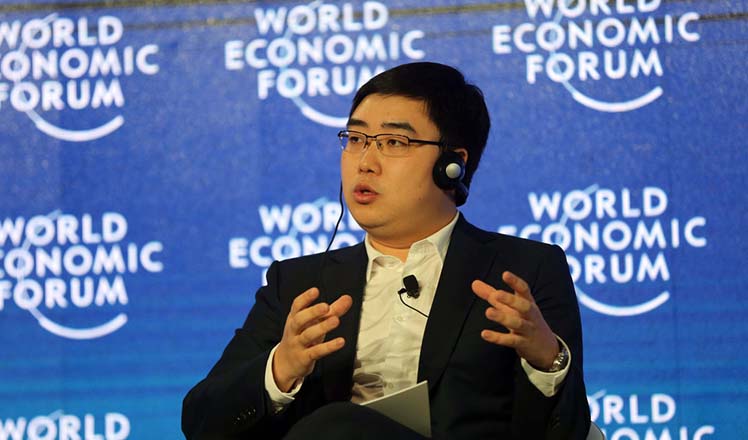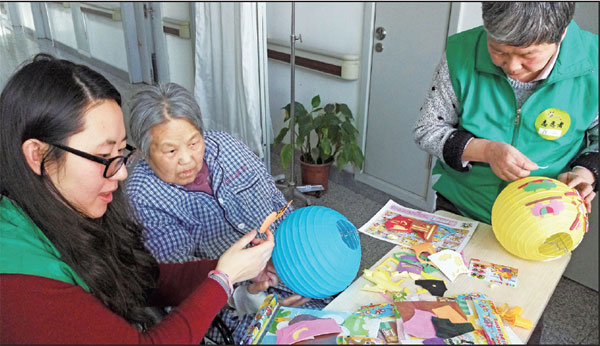Living wills enliven debate about death
Updated: 2016-11-03 07:58
By Liu Zhihua(China Daily)
|
||||||||
|
A patient in the oncology and hematology department of the Beijing Haidian Hospital makes paper lanterns in the company of volunteers from the Beijing Living Will Promotion Association.Ting Ting / For China Daily |
A growing number of people believe that quality of life is more important than longevity. Liu Zhihua reports.
Attitudes to death are changing in China. Once, the subject was taboo - the number four, si in Chinese, is still deemed unlucky because it sounds uncomfortably like the word for death - and traditionally, people have been reluctant to discuss the end of life or challenge treatment plans presented by physicians or close relatives.
The situation is now changing, partly because of greater contact with the outside world and partly thanks to the advent of "living wills".
The wills offer people the opportunity to specify how they want to spend their final days, and provide a guarantee that their wishes will be acted upon in the event that illness means they are unable to communicate, consent or disagree.
The wills are not legally binding and the testator is allowed to withdraw the document, but for the first time people are being offered a chance to state the treatment and life-support measures they would be willing to accept as death draws near, ranging from being fed by a tube, to having invasive ventilation, dialysis and cardiopulmonary resuscitation.
According to the Beijing Living Will Promotion Association, the first organization on the mainland to provide living wills online, more than 20,000 people have signed up via its website, which has been visited by tens of thousands keen to learn more about the process.
According to Luo Diandian, who founded the association in 2013, the idea is catching on outside the capital, and the association has been contacted by people in Guangzhou and Shenzhen, Guangdong province, and Xi'an, Shaanxi province, who are considering establishing similar projects.
"About 10 years ago, no one talked about living wills in China. When I tried to convince people of the necessity of making one, they immediately thought I was talking about euthanasia (which is illegal in China), and rebuffed any further attempts at conversation," the retired cardiologist said.
"Now, living wills and palliative care are often the topics of government conferences and forums and no matter whether people see the necessity for them or not, at least they know about them."
Maternal influence
In 2013, when Beijing resident Cui Di (not her real name) heard about Luo's website, she didn't hesitate to make a living will. The 60-something retiree said her decision had been influenced by her mother, who died from colorectal cancer.
Although Cui's mother told the family about her illness in January, 2002, she refused to be hospitalized. A few weeks later, during Spring Festival, she asked Cui to take her to the hospital, where she rejected all treatment except pain relief. She died two months later.
- Syrian army announces 'humanitarian pause' on Friday
- Park shuffles Cabinet, infuriates opposition
- Court to rule on whether London needs parliament to trigger EU exit
- Seeing country more polarized, American voters fear for future
- France to begin moving migrant minors from Calais
- China-Japan ties growing but unstable: Premier

 China's top 10 post-80s self-made billionaires
China's top 10 post-80s self-made billionaires
 Famous paintings recreated with chocolate
Famous paintings recreated with chocolate
 Looking for a ride?
Looking for a ride?
 Robots draw people to China International Industry Fair
Robots draw people to China International Industry Fair
 German international Miroslav Klose retires
German international Miroslav Klose retires
 Top 10 most influential Japanese cartoons in China
Top 10 most influential Japanese cartoons in China
 Opera performer who takes her shows to villages
Opera performer who takes her shows to villages
 13 most appealing cars in China in 2016
13 most appealing cars in China in 2016
Most Viewed
Editor's Picks

|

|

|

|

|

|
Today's Top News
US election rhetoric unlikely to foreshadow future US-China relations
'Zero Hunger Run' held in Rome
Trump outlines anti-terror plan, proposing extreme vetting for immigrants
Phelps puts spotlight on cupping
US launches airstrikes against IS targets in Libya's Sirte
Ministry slams US-Korean THAAD deployment
Two police officers shot at protest in Dallas
Abe's blame game reveals his policies failing to get results
US Weekly

|

|








